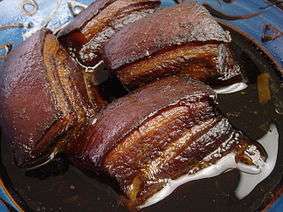Zhejiang cuisine

 |
| This article is part of the series |
| Chinese cuisine |
|---|
|
|
Ingredients and types of food |
|
|
Zhejiang cuisine (Chinese: 浙菜, p Zhècài) is one of the Eight Culinary Traditions of Chinese cuisine. It derives from the traditional ways of cooking in Zhejiang province in China, south of Shanghai and around the former Chinese capital of Hangzhou. In general, Zhejiang-style food is not greasy but has a fresh and soft flavour with a mellow fragrance.[1]
Styles
Zhejiang cuisine consists of at least three styles, each originating from a city in the province:[2]
| Cuisine | Description |
|---|---|
| Hangzhou | Characterised by rich variations and the utilisation of bamboo shoots. It is served by restaurants such as the Dragon Well Manor.[3] |
| Shaoxing | Specialising in poultry and freshwater fish. |
| Ningbo | Specialising in seafood, with emphasis on freshness and salty dishes. |
Some sources also include the Wenzhou style as a separate subdivision (due to its proximity to Fujian), characterised as the greatest source of seafood as well as poultry and livestock.[4]
Notable dishes
- Dongpo pork (simplified Chinese: 东坡肉; traditional Chinese: 東坡肉; pinyin: dōngpō ròu), fried pork belly stewed in soy sauce and wine.
- Beggar's Chicken (simplified Chinese: 叫化鸡; traditional Chinese: 叫化雞; pinyin: jiàohuā jī), which originated from Jiangsu but gained its popularity in Hangzhou and thus considered a Hangzhou cuisine.
- West Lake fish in vinegar (Chinese: 西湖醋魚; pinyin: xīhú cùyú)
- West Lake chuncai soup (Chinese: 西湖莼菜汤; pinyin: xīhú chúncài tāng)
About half the dishes on a Hangzhou menu contain bamboo shoots, which add a tender element to the food.
Ningbo cuisine is regarded as rather salty.[2] Ningbo confectioneries were celebrated all over China during the Qing Dynasty.[5]
References
- ↑ "Beijing 2008 Olympics - Zhejiang Cuisine". People's Daily Online. 2008. Retrieved 2008-09-22.
- 1 2 "Zhejiang Cuisine". China Daily. 2005. Archived from the original on September 18, 2008. Retrieved 2008-09-22.
- ↑ Dunlop, Fuchsia (2009-09-26), "Hangzhou's rich gastronomic history", Financial Times
- ↑ "Zhejiang Cuisine and Restaurants". www.ChinaPlanner.com. 2004. Retrieved 2008-09-22.
- ↑ Marcus Benjamin; Arthur Elmore Bostwick; Gerald Van Casteel; George Jotham Hagar, eds. (1910). Appleton's new practical cyclopedia: a new work of reference based upon the best authorities, and systematically arranged for use in home and school. Volume 4 of Appleton's New Practical Cyclopedia. NEW YORK: D. Appleton and company,. p. 432. Retrieved 18 July 2011.(Original from the University of Michigan)
